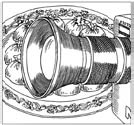Don't let bad apple spoil journalism
By Raymond Zhou (China Daily)Updated: 2007-07-21 06:45
What could be worse than a food scandal?
The answer: a fake food scandal designed to add dramatic tension to an already delicate issue.
 Some Chinese manufacturers have been accused of turning out
inferior-quality or counterfeit food or drug products. Some have been found to
cut corners in ingredients, while others might have used specifications out of
sync with the rest of the world.
Some Chinese manufacturers have been accused of turning out
inferior-quality or counterfeit food or drug products. Some have been found to
cut corners in ingredients, while others might have used specifications out of
sync with the rest of the world.
Of course, the whole world has reason to worry. Food and drugs are not like ordinary goods. If I bought a substandard T-shirt and it disintegrated the next day, well, I just wasted a couple of bucks. But whatever I put into my body, the consequences could be long-lasting.
That is why anyone who violates the law in these matters, more than in anything else, should be prosecuted to the full extent of the law. Zheng Xiaoyu, the former food and drug czar, did not get a tear of sympathy when he was sentenced to die for taking bribes in exchange for approving drugs, some of which did not comply with their own claims.
It is an ominous sign when journalists uncover food scandals. This is the job of official food inspectors. If they are competent, journalists won't have a field day doing such exposes. Yet, a journalist is not exceeding his function when he does that. He provides the random checks that food producers probably fear more than the mass campaigns that often begin with thunder and end with a drizzle.
But just as there are corrupt officials, there are unscrupulous journalists. The cardboard baozi story of this week adds a satirical twist to a tale of international interest.
Here's what's been reported: A freelancing producer for Beijing TV, by the name of Zi, asked a breakfast kitchen to make baozi (steamed bun with pork fillings), but instead of pork and other edibles, he had them put in cardboard. He videotaped the process and broadcast it as an investigative story.
If this is true, Zi was not being overzealous in protecting consumer rights,
but equated journalism with making fictional feature films. He did not blow up a
story, but scripted and directed it. The fact that he was a freelancer does not
really matter because most who work in China's television industry do not have
the iron-rice bowl. And lack of training is also a lame excuse. Anyone who gets
into journalism should know the difference between telling a real story and
fabricating one. 
But in the mad dash for ratings, the sacred line dividing fact and fiction is sometimes blurred. Many television shows use recreations, but contrary to the common practice in other countries, most programs here keep it a secret. Next time you see a talk show featuring a family feud, just remind yourself this could be some unknown actors reading from a script.
I once told wannabe journalists that if you have a rich imagination and tend to concoct or embellish your stories, you'd better get into a more lucrative profession: writing for movies or television drama.
Uncovering a fake food scare may shed light on the deplorable lack of ethics among some journalists, but it does not ease pressure on food safety officials, whose job is much more essential to our lives. Just as one should not incriminate a whole country's food industry with a few scandals, one should not let one bad apple spoil the work of all journalists. We have heroes among us, too, the most recent example being Fu Zhenzhong, the Henan television reporter who exposed the shocking kiln slavery in Shanxi.
Email: raymondzhou@chinadaily.com.cn
(China Daily 07/21/2007 page4)
|
|
|
|